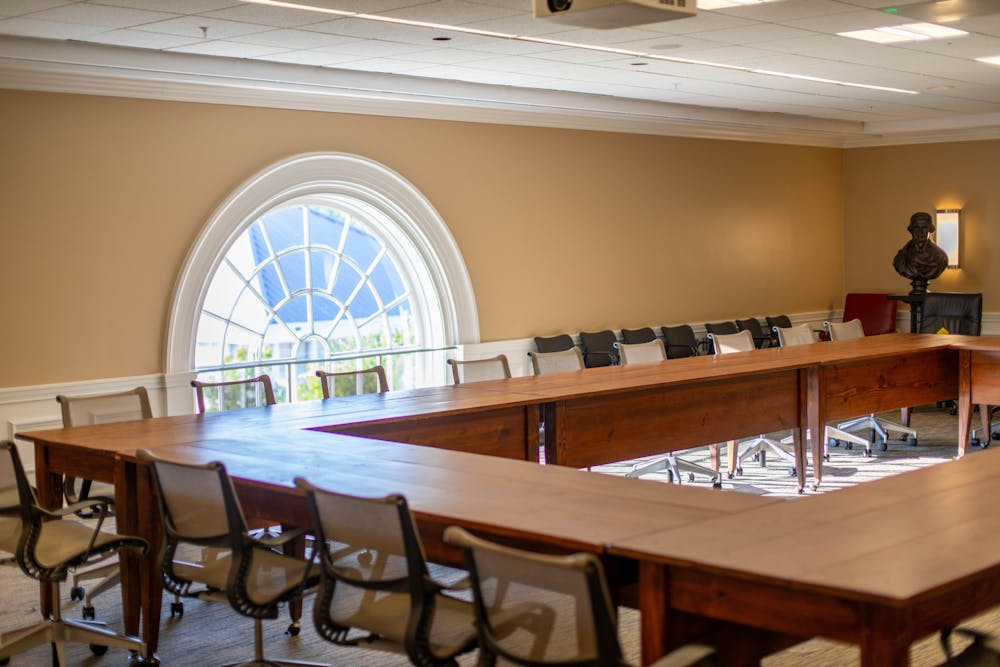The Honor Committee gathered to review the outcomes of the inaugural fall restorative seminar on Sunday. The meeting involved a discussion on last semester’s seminar results and explored avenues to refine the program in the forthcoming semesters. The committee also considered potential adjustments to the University's mandatory honor modules.
The restorative seminar is a student-led initiative, functioning as a rehabilitative course for individuals found guilty and issued the education sanction. A new element in the multi-sanction system, the course is designed to initiate dialogues on the principles of honor, offering students a platform to reaffirm their commitment to the University community. The seminar was proposed by Will Hancock, senior educator and second-year College student, last April. Over the course of seven weeks, participants engage in a weekly 45-minute session— last semester’s session involved two sanctioned students.
Honor educators lead the seminar, with facilitation provided by members of the Executive Committee, all of whom are also students. Additionally, sessions include insights from individuals with prior honor offenses. Honor educators, drawn from the Committee’s support officer pool, bear the responsibility of informing the community on the principles and processes of the honor system.
Hamza Aziz, Committee Chair and fourth-year College student, said that honor educators received training in dialogue facilitation from professionals. Jessica Hawthorne, Vice President of Programs at the Virginia Center for Inclusive Communities, trained members on facilitating inclusive and productive course discussions.
“We talked through how to design and facilitate dialogues [and] how to build inclusive communities,” Aziz said. “It was a very productive session.”
Hancock discussed the strengths and weaknesses of the seminar course, outlining takeaways to further enhance future seminars. It was more successful, according to Hancock, to focus on community building through stressing big-picture values rather than a focus on self-improvement. He also said that a lecture-based course was more effective than an open discussion.
Discussion within this rehabilitative course will continue to look different in future semesters as the Committee anticipates creating room for a larger class size, according to Hancock.
“In the future, we think the cap will be seven to ten students, so we are looking at how the conversations will be different,” Hancock said. “We will work on incorporating the right tones and approaches with the new facilitators we are training.”
Law Rep. MK O’Boyle noted the positive results and praised the open discussion brought by the seminar.
"I thought the seminar was very well-organized and very well-run,” O’Boyle said. “It was great to see the students speaking about such a sensitive topic with Honor reps and give [executive members] direct feedback about their experience with the case process.”
The committee then reviewed the XYZ Case Studies, a component of the course designed to promote transparency, consistency, and fairness throughout the Honor System. These written reflections, documented by the two Honor students throughout the course, will be shared with the University community to spread the values embraced by the Honor System.
The Committee intends to leverage insights from the Fall seminar results and XYZ cases to enhance future seminars.
Aziz led an additional discussion on potential modifications to required honor modules — online modules that all first years must complete before matriculating to the University. Aziz proposed incorporating more academic integrity based content, potentially using U.Va. Library's ethical citation module as a foundation.
“The [modules] are lacking a lot of academic integrity content and information ethics content,” Aziz said. “The [University library] has shared an open and willing desire for Honor to use as much of that content as Honor would like.”
Aziz aims to finalize the revised module — focused on the ethics behind academic integrity — by April. He also discussed potentially adding a re-completion requirement for the modules, where the Honor module would appear on the Student Information System again following initial completion, after a given number of years.
“We could look into making the module be required after a specific time, whether that's one year or two years,” Aziz said. “If we do have a leaning towards this, I can make sure that Student Affairs is okay with it and [make] sure we are not overburdening students with module environments. It is something that is on the table.”
The Honor Committee entered closed session at 7:52 P.M., with plans to reconvene in person at Newcomb Hall on Sunday at 7:00 P.M.
CORRECTION: A previous version of this article incorrectly stated that participants engaged in the restorative seminar for 45-minute sessions twice a week. Participants only engaged in the seminar’s 45-minute sessions once a week and the article has since been updated to reflect this change.







